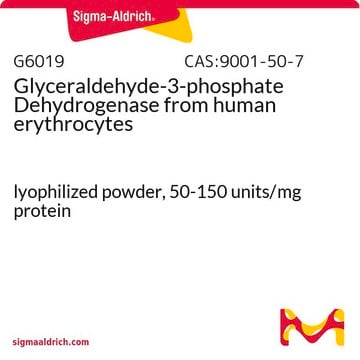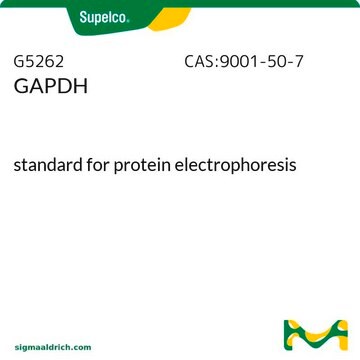SRE0024
Glyceraldehyde-3-phosphate dehydrogenase human
recombinant, expressed in Escherichia coli
Sinónimos:
D-Glyceraldehyde-3-phosphate: NAD+ oxidoreductase (phosphorylating), GAPDH, Triosephosphate dehydrogenase
Iniciar sesiónpara Ver la Fijación de precios por contrato y de la organización
About This Item
Comisión internacional de enzimas:
1.2.1.12
UNSPSC Code:
12352204
NACRES:
NA.54
Productos recomendados
recombinant
expressed in E. coli
Quality Level
specific activity
≥80 units/mg protein
storage temp.
−20°C
Categorías relacionadas
General description
Glyceraldehyde-3-phosphate dehydrogenase (GAPDH) localizes to the cytoplasm but can be translocated to the nucleus depending on cellular conditions. It is a tetramer containing identical chains. The gene encoding GAPDH is localized on human chromosome 12p13.
Application
Human glyceraldehyde-3-phosphate dehydrogenase has been used as a positive control for hydrogen sulfide treatment to detect sulfhydration of protein targets.
Biochem/physiol Actions
Glyceraldehyde-3-phosphate dehydrogenase (GAPDH) catalyzes the reversible oxidative phosphorylation of glyceraldehyde-phosphate, which is a critical energy-yielding step in carbohydrate metabolism. It binds to several proteins including actin, tubulin, amyloid precursor, polyglutamine peptides, DRPLA (dentatorubral-pallidoluysian atrophy) and huntingtin. Phosphorylated GAPDH associates with cytoskeletal elements and controls microtubule dynamics in the early secretory pathway. GAPDH is also a component of the functional GAIT (interferon-?-activated inhibitor of translation) mRNP (messenger ribonucleoprotein). GAPDH expression is dysregulated during melanoma progression.
Unit Definition
One unit will reduce 1.0 μmole of 3-phosphoglycerate to D-glyceraldehyde 3-phosphate per minute in a coupled system with 3-phosphoglyceric phosphokinase (3-PGK) at pH 7.6 at 25 °C
Physical form
This product is recombinant, human GAPDH expressed in E. coli with an N-terminal histidine tag and has a predicted molecular mass of 37,984 Da. The product is lyophilized from a buffered solution with stabilizers.
Other Notes
Alternative number: CAS Number 9001-50-7
signalword
Warning
hcodes
Hazard Classifications
Eye Irrit. 2
Storage Class
11 - Combustible Solids
wgk_germany
WGK 3
flash_point_f
Not applicable
flash_point_c
Not applicable
Certificados de análisis (COA)
Busque Certificados de análisis (COA) introduciendo el número de lote del producto. Los números de lote se encuentran en la etiqueta del producto después de las palabras «Lot» o «Batch»
¿Ya tiene este producto?
Encuentre la documentación para los productos que ha comprado recientemente en la Biblioteca de documentos.
Los clientes también vieron
Gennaro Napolitano et al.
EMBO molecular medicine, 7(2), 158-174 (2015-01-15)
Metabolite accumulation in lysosomal storage disorders (LSDs) results in impaired cell function and multi-systemic disease. Although substrate reduction and lysosomal overload-decreasing therapies can ameliorate disease progression, the significance of lysosomal overload-independent mechanisms in the development of cellular dysfunction is unknown
Noncanonical function of glutamyl-prolyl-tRNA synthetase: gene-specific silencing of translation.
Sampath P, et al.
Cell, 119(2), 195-208 (2004)
Hydrogen sulfide inhibits Kir2 and Kir3 channels by decreasing sensitivity to the phospholipid PIP2.
Ha J, et al.
The Journal of Biological Chemistry, RA117-RA117 (2018)
Deregulation of glyceraldehyde-3-phosphate dehydrogenase expression during tumor progression of human cutaneous melanoma.
Ramos D, et al.
Anticancer Research, 35(1), 439-444 (2015)
Glyceraldehyde-3-phosphate dehydrogenase is phosphorylated by protein kinase Ciota /lambda and plays a role in microtubule dynamics in the early secretory pathway.
Tisdale E J.
The Journal of Biological Chemistry, 277(5), 3334-3341 (2002)
Nuestro equipo de científicos tiene experiencia en todas las áreas de investigación: Ciencias de la vida, Ciencia de los materiales, Síntesis química, Cromatografía, Analítica y muchas otras.
Póngase en contacto con el Servicio técnico









